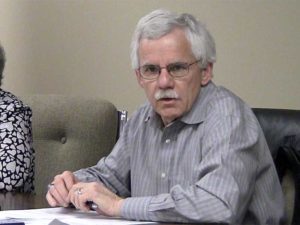Council upholds HRB denial of Newcomb application to demolish home
By JIM BROOKS
Nelson County Gazette / WBRT Radio
Tuesday, Dec. 27, 2016, 11 p.m. — The Bardstown City Council voted Tuesday night to uphold the Historic Review Board’s recommendation to deny Newcomb Oil Co.’s request to demolish the brick home next to the company’s Five Star Food Mart at Second Street and East Stephen Foster Avenue.

Councilman Fred Hagan made the motion to uphold the Historic Review Board’s recommendation denying Newcomb Oil Co.’s application to demolish the home it owns next to the Fives Star Food Mart at Second and Stephen Foster. The company has owned the home since 1998.
Councilman Fred Hagan said he believed the HRB gave the matter proper review and that he supported the HRB decision to deny the home’s demolition. Councilman Roland Williams and Bobby Simpson agreed.
Councilman Bill Buckman sided with the company and the value the business brings to downtown.
“My opinion is that house has no historical value,” Buckman said, adding that its the only market in the downtown area.
“This a very important hub for working class people in Bardstown. I vote is to tear it down.”
Buckman said the county recently tore down a home next to the Sutherland Building and created a parking lot. “Where was the outcry about that?”
After a short deliberation Tuesday night, Hagan, Williams and Simpson voted to uphold the HRB’s decision to prevent the demotion, while Councilman Bill Buckman voted in favor of it. Prior to the vote, City Attorney Tim Butler announced that Councilwoman Kecia Copeland would abstain from both the vote an discussion on the issue.
In September, the company applied for permission to demolish the home it has owned since 1998 in order to make the room it says it needs for a new, modern food mart similar to the others it has built in the area in recent years.
But the home lies in the city’s historic district, and it falls under national preservation standards that encourage renovating and reusing properties rather than demolishing them to build new ones.
The HRB’s initial denial in September was based on what the board said was insufficient proof that denying the request to demolish the property would create an economic hardship on the company.

Outgoing Councilman Hagan speaks with incoming Councilman John Kelley Jr. after Tuesday’s council meeting.
When the company appealed the HRB’s recommendation to deny their application to the Bardstown City Council, the company provided the council with extensive financial records it said documented that economic hardship.
Rather than overturn the board’s recommendation, the council sent the matter back to the HRB to give them an opportunity to review the company’s new financial documentation.
After its review of the new documentation, the HRB again decided the company did not meet the requirements to prove economic hardship — particularly proof that the company could not obtain any reasonable rate of return without its demolition.
WHY PROOF OF ECONOMIC HARDSHIP IS KEY. Tearing down a home in the city’s historic district is difficult — by design. In the boundaries of the city’s historic district, the emphasis is on keeping old buildings in use, and finding new uses for them instead of tearing them down and building new ones.
And because the entire historic district is also registered with the National Register of Historic Places, the HRB is required to follow preservation guidelines set by the U.S. Department of the Interior and the National Park Service.
RaShae Jennings, the city’s preservation director, explained at the Newcomb Oil’s appeal before the council that the affected home — known as “the Dobbs house” — is considered a contributing structure in the historic district. While it isn’t as old as other homes in the district, the home represents the story of the evolution of Bardstown’s downtown over time, she explained.
The city’s historic district dates back to 1966. The district was first registered with the National Register in 1983. The district was expanded in 2010 to bring in additional properties, and these were also added to the National Register at that time.
Approval to demolish homes in historic districts are held to very high standards. As explained by the Louisville Landmarks Commission in its requirements to meet its economic hardship provision :
“The test for economic hardship is not whether demolition or proposed new construction provides a better use or return, but whether denial of the owner’s request to demolish or build deprives the owner of any reasonable beneficial use in the case of a non-income producing property, or any reasonable return in the case of an income-producing property. The burden of proof is on the property owner to prove that any reasonable beneficial use (in the case of non income producing property) or any reasonable return (for income producing property) cannot be obtained without the proposed demolition and/or new construction.”
According to the minutes of the HRB’s Dec. 20 meeting, it was this requirement where the Newcomb Oil documentation fell short.
WHAT’S NEXT? If the company wishes, it can appeal the HRB’s decision in Nelson Circuit Court.
-30-






